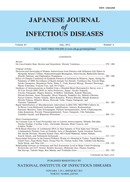
JAPANESE JOURNAL OF INFECTIOUS DISEASES
Scope & Guideline
Exploring innovative solutions to combat infectious diseases.
Introduction
Aims and Scopes
- Molecular Epidemiology:
The journal highlights studies that investigate the genetic and molecular characteristics of pathogens, including resistance patterns and transmission dynamics. This focus aids in understanding outbreaks and informs public health responses. - Clinical Research and Case Studies:
A significant portion of the journal is dedicated to clinical research, including case reports and treatment evaluations. These studies provide insights into patient management and the efficacy of various therapeutic approaches. - Public Health and Epidemiology:
Research addressing public health implications, disease surveillance, and epidemiological trends is central to the journal’s scope. This includes studies on vaccine effectiveness, disease burden, and risk factors associated with infectious diseases. - Translational Research:
The journal also promotes translational research that connects laboratory findings to clinical practice, such as new diagnostic methods and treatment protocols aimed at improving patient outcomes. - Emerging Infectious Diseases:
There is a strong emphasis on emerging and re-emerging infectious diseases, particularly those affecting the Japanese population. This includes research on novel pathogens and the impact of global health crises, such as the COVID-19 pandemic.
Trending and Emerging
- COVID-19 Research:
A substantial increase in publications related to COVID-19, including studies on transmission dynamics, clinical outcomes, and vaccine efficacy, highlights the journal's responsiveness to the ongoing pandemic and its impact on public health. - Molecular Diagnostics and Genomics:
There is a growing emphasis on molecular diagnostics and genomic studies of pathogens. This trend indicates a shift toward more precise and rapid identification methods that enhance disease management and outbreak response. - Antimicrobial Stewardship and Resistance Mechanisms:
Research focused on antimicrobial stewardship programs and the mechanisms of resistance has gained prominence. This reflects an increasing recognition of the need to address antimicrobial resistance proactively. - Viral Hemorrhagic Fevers and Emerging Viruses:
The journal has seen a rise in studies addressing viral hemorrhagic fevers and newly identified viruses. This trend underscores the importance of monitoring and researching emerging pathogens that pose significant health risks. - Vaccination Strategies and Immunogenicity Studies:
There is an emerging focus on the evaluation of vaccination strategies, particularly novel vaccine platforms and their immunogenicity. This shift is crucial for developing effective responses to both existing and emerging infectious diseases.
Declining or Waning
- Antimicrobial Resistance in Non-Pathogenic Bacteria:
While antimicrobial resistance remains a critical issue, studies specifically focused on non-pathogenic bacteria have decreased. This may indicate a shift toward more clinically relevant pathogens or a focus on resistance mechanisms. - Historical Epidemiological Studies:
Research that focuses on historical epidemiological data or trends appears to be declining. This could be due to a preference for contemporary studies that address current public health challenges. - Vaccine Development for Established Diseases:
There has been a noticeable reduction in studies aimed at vaccine development for diseases that are already well-established in vaccination programs. This could reflect a shift in focus to more pressing or emerging infectious diseases. - Traditional Diagnostic Techniques:
Research employing conventional diagnostic methods is increasingly being replaced by studies utilizing advanced molecular techniques. This trend may suggest a waning interest in traditional methodologies as newer technologies become more prevalent. - Zoonotic Diseases from Domestic Animals:
Although zoonotic diseases remain important, the journal has published fewer studies specifically addressing infections transmitted from domestic animals. This may indicate a broader focus on human-centric infectious diseases.
Similar Journals
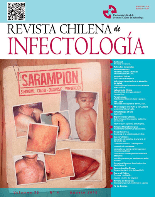
Revista Chilena de Infectologia
Exploring critical findings in infectious disease dynamics.Revista Chilena de Infectologia is an esteemed academic journal dedicated to the field of infectious diseases and public health. Published by the SOC CHILENA INFECTOLOGIA, this journal has been pivotal in disseminating crucial research findings since its inception in 2000. While operating under ISSN 0716-1018 and E-ISSN 0717-6341, it aims to contribute to the understanding of both local and global health issues, particularly within the context of Chile. Currently, it holds a Q4 ranking in both the Infectious Diseases and Public Health, Environmental and Occupational Health categories as of 2023, reflecting its unique position among emerging voices in the field. The journal aspires to foster collaboration among researchers, professionals, and students by offering a platform for innovative studies and discussions that address pressing health challenges. Although it is not an Open Access journal, access options through institutional subscriptions are encouraged for a comprehensive review of its significant contributions to infectious disease research.

Infectious Disease Reports
Advancing global health through groundbreaking research.Infectious Disease Reports is a premier open-access journal published by MDPI, dedicated to advancing the field of infectious diseases. Since its inception in 2009, this journal has established itself as a significant platform for disseminating cutting-edge research, reviews, and case studies, critical for global health. With a commendable Q2 ranking in the category of Infectious Diseases and a Scopus rank of #140 out of 344, it is recognized for its impactful contributions to medical research, holding a 59th percentile in its field. The journal aims to provide comprehensive insights into various dimensions of infectious diseases, ranging from epidemiology to novel treatment modalities. As an open-access publication, Infectious Disease Reports ensures that its articles are freely available to a wide audience, fostering collaborative efforts among researchers, healthcare professionals, and students worldwide. With its ongoing commitment to excellence, the journal plays an essential role in shaping the future of infectious disease research.

Reviews and Research in Medical Microbiology
Pioneering Insights into Pathogens and HealthReviews and Research in Medical Microbiology is a premier academic journal published by LIPPINCOTT WILLIAMS & WILKINS, focusing on groundbreaking research and comprehensive reviews that advance the understanding of medical microbiology. With an ISSN of 2770-3150 and an E-ISSN of 2770-3169, this journal serves as an essential resource for researchers, healthcare professionals, and students dedicated to the study of pathogens, infectious diseases, and microbial mechanisms affecting health. While the journal currently does not offer open access, its rigorous peer-review process ensures that only high-quality, impactful research is disseminated to the scientific community. The journal aims to bridge gaps in knowledge by presenting cutting-edge studies that explore novel therapeutic strategies, diagnostic methods, and the evolving landscape of microbial resistance. Nestled in the heart of Philadelphia, this journal proudly contributes to the advancement of medical microbiology and is an indispensable platform for the publication of critical findings that shape clinical practices and research trajectories in the field.
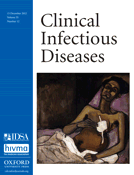
CLINICAL INFECTIOUS DISEASES
Advancing the fight against infectious diseases.Clinical Infectious Diseases, published by Oxford University Press Inc, is a premier journal in the fields of infectious diseases and microbiology, distinguished by its esteemed Q1 ranking in both categories as of 2023. Since its inception, the journal has served as a vital platform for disseminating cutting-edge research and significant advancements in the diagnosis, treatment, and prevention of infectious diseases. With a broad scope encompassing clinical trials, epidemiological studies, and public health research, it targets a diverse readership, including researchers, healthcare professionals, and students. The journal's robust reputation is underscored by its impactful contributions to scientific understanding, making it a critical resource for those striving to combat infectious diseases globally. Clinical Infectious Diseases is not open access but offers various subscription options, ensuring comprehensive access to its high-quality content. With a historical continuity from 1985 to present, the journal remains at the forefront of medical research, paving the way for future innovations in the field.

Revista da Sociedade Brasileira de Medicina Tropical
Empowering public health through impactful research.Revista da Sociedade Brasileira de Medicina Tropical is a distinguished open-access journal published by the Sociedade Brasileira de Medicina Tropical, focusing on the critical fields of Infectious Diseases, Microbiology, and Parasitology. Since its inception in 1972, this journal has committed to disseminating impactful research that addresses pressing global health challenges, particularly in tropical and infectious diseases prevalent in Brazil and beyond. With a robust publication history, it has been recognized as a Q3 journal in esteemed categories, reflecting its valuable contributions to scientific literature and its ranking in various Scopus categories, including a notable position in Parasitology. Researchers, professionals, and students are encouraged to engage with its rich repository of research, which has been freely accessible since 1997, fostering a wide-reaching impact on public health strategy and scientific innovation.
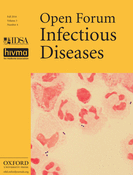
Open Forum Infectious Diseases
Advancing knowledge in infectious diseases.Open Forum Infectious Diseases (ISSN: 2328-8957; E-ISSN: 2328-8957) is a leading open-access journal published by Oxford University Press, dedicated to advancing the field of infectious diseases. Since its inception in 2014, the journal has provided a platform for researchers to disseminate impactful findings in a rapidly evolving domain, achieving a remarkable Q1 ranking in both the Infectious Diseases and Oncology categories as of 2023. The journal encourages rigorous and innovative research, contributing significantly to global health discussions and informing best practices in clinical settings. As an open-access journal, it ensures that its content is accessible to a wide audience, fostering collaboration and knowledge sharing among researchers, professionals, and students alike. Positioned in the heart of the United States, Open Forum Infectious Diseases serves as a critical resource for the academic community, and its continued commitment to quality and relevance secures its status as an essential publication in the field.

Archives of Clinical Infectious Diseases
Advancing the Frontiers of Infectious Disease ResearchArchives of Clinical Infectious Diseases is a peer-reviewed journal dedicated to advancing knowledge in the field of infectious diseases, published by BRIEFLAND in Iran. With a broad scope, it covers various aspects of cardiology, critical care, immunology, microbiology, public health, and toxicology, affirming its relevance in today's health landscape. Despite the lack of open access options, the journal maintains a strong reputation, reflected in its Q3 ranking in multiple categories within the 2023 category quartiles. The journal aims to provide a platform for researchers and practitioners to disseminate critical findings that can impact clinical practices and public health policies. Its commitment to rigorous peer review ensures that only high-quality research is published, thereby serving as an essential resource for professionals, students, and public health advocates. For those engaged in the ever-evolving world of infectious diseases, Archives of Clinical Infectious Diseases stands as a vital contribution to the medical literature.
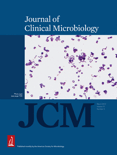
JOURNAL OF CLINICAL MICROBIOLOGY
Pioneering Research for Tomorrow's HealthcareJOURNAL OF CLINICAL MICROBIOLOGY, published by the American Society for Microbiology, stands as a premier resource for researchers and professionals in the field of medical microbiology. With an illustrious history dating back to 1975, this journal has consistently provided high-impact research, reflecting its status in the Q1 category among microbiology (medical) journals, and an impressive Scopus rank of 14 out of 140, placing it in the 90th percentile. The journal's commitment to unveiling foundational and innovative studies greatly contributes to understanding human health challenges posed by microbial pathogens. Researchers can expect rigorous peer-reviewed articles that cover a spectrum of topics, from diagnostic methods to clinical epidemiology, fostering a deeper understanding of microbiology's role in healthcare. While this journal does not offer open access options, its substantial impact factor underscores its relevance in shaping the conversation in clinical microbiology. The JOURNAL OF CLINICAL MICROBIOLOGY is indispensable for anyone dedicated to advancing their knowledge and practical skills in microbiology.

New Microbes and New Infections
Unveiling the latest breakthroughs in microbiology and infectious diseases.New Microbes and New Infections is an esteemed peer-reviewed journal published by Elsevier Sci Ltd that has been a prominent platform for disseminating groundbreaking research in the fields of Infectious Diseases and Microbiology since its establishment in 2013. With an impressive Open Access model, this journal ensures that vital research findings are readily accessible to researchers, healthcare professionals, and academics worldwide. Positioned in the Q2 category for Infectious Diseases and Q3 for Microbiology in 2023, it reaches a significant global audience, as demonstrated by its high Scopus rankings—#44 out of 344 in Medicine: Infectious Diseases, and #34 out of 182 in Immunology and Microbiology. The journal aims to inspire new ideas and foster collaborations by publishing high-quality research focused on novel microbes and infections, thus playing a crucial role in advancing science and public health in an era where understanding infectious agents is more vital than ever.
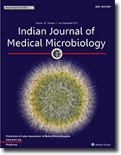
Indian Journal of Medical Microbiology
Advancing the Frontiers of Medical MicrobiologyIndian Journal of Medical Microbiology, published by Elsevier, is a pivotal peer-reviewed journal dedicated to the field of medical microbiology, providing a vital platform for research and scholarship since its inception in 1986. With an Open Access model established in 2001, it ensures the dissemination of scientific knowledge to a global audience, enhancing accessibility for researchers, professionals, and students alike. The journal's scope spans critical areas including immunology, infectious diseases, and microbiology, with an impressive trajectory marked by converged years of publication allowing for a comprehensive exploration of evolving scientific trends. As of 2023, the journal holds a Q3 ranking in Infectious Diseases and Microbiology (medical) and a Q4 ranking in Immunology and Microbiology categories, reflecting its significant yet growing impact in the field. Researchers seeking to contribute to or stay updated on the latest advancements in medical microbiology will find the Indian Journal of Medical Microbiology a valuable resource, as it consistently bridges the gap between emerging science and clinical application.